Albanese v Dutton: ideological fight for the country’s future
There is an unbridled ideological conflict underlying this election that reaches beyond the economic debate and runs deep into the social fabric.
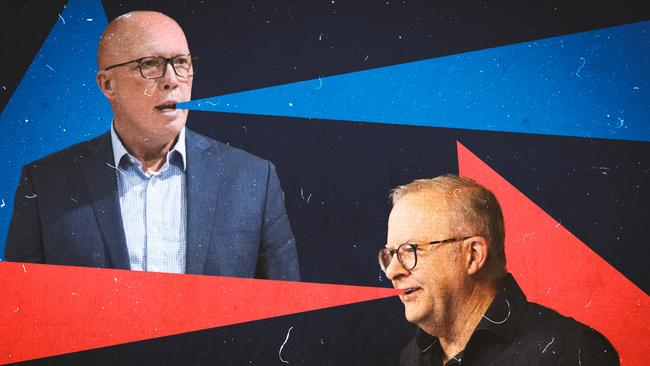
Australia has rarely been a nation as deeply divided. This is the essential issue that will define the approaching federal election.
Peter Dutton frames it as a “sliding doors” moment for the country. Anthony Albanese’s depiction is no less significant. The Prime Minister describes it as a contest between the future and the past. It is the future wars, he says.
Both leaders, speaking exclusively to The Weekend Australian this week, are right. But this is about all they would agree on.
There is little if anything the Opposition Leader would concede that Labor has done right in the past three years, aside from signing up to the AUKUS security pact. There is nothing Albanese believes the opposition wouldn’t undo given the chance.
In terms of bipartisan positions, aged care reform and the National Disability Insurance Scheme stand almost alone.
As for the broader contest, the oppositional politics may appear feigned, but that in itself is misleading. There is an unbridled ideological conflict underlying this election that reaches beyond the economic debate and runs deep into the social fabric.
Tony Abbott and Julia Gillard sparred over asylum-seeker boats and the carbon tax. But at the core of the contest between Dutton and Albanese is a schism that has not been as profound since the Whitlam-Fraser divide of the 1970s.
Dutton’s opposition to the Indigenous voice should have been a proof point of this awakening. This schism is perhaps the most misunderstood point of the coming election. Everything is at stake.
The Liberal leader’s premise is an uncomplicated and potent one. Prosperity and security can no longer be assured under Labor led by a weakened Prime Minister. It is a deliberately artless appeal to Middle Australia.
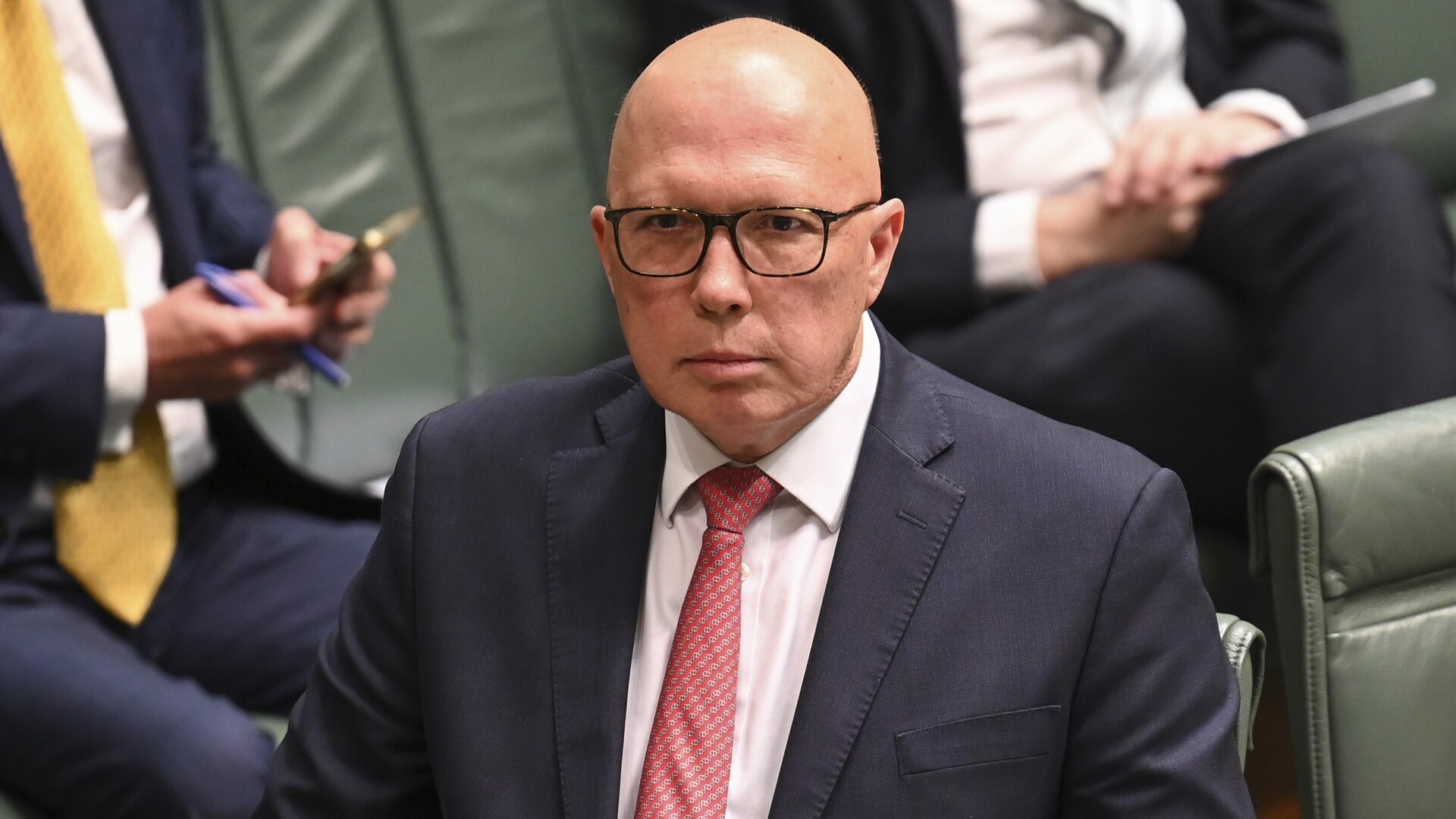
“This is a simple issue of trust,” Dutton tells Inquirer. “Trust on the economy, cost of living and trust on national security. They become the two issues once again. Who do you trust to get the economy back on track and keep you safe in an uncertain world?
“They are front and centre of this election.”
But the subtext is more profound. National security, sovereignty, national ethos, a rejection of identity politics and a return to conservative values are the threads that weave together Dutton’s narrative.
But it is Dutton’s apparent lack of a future-driven agenda that represents a plunge into the dark, according to Albanese. This is the counterargument that Labor seeks to exploit: a return to a past that means little to the current generation.
Through its own admission, the opposition’s solution offers little more than a revival of the economics of John Howard and Peter Costello, a formula applied to a different time and a different world.
Dutton’s bet is that any lack of a feasible future agenda is secondary to the primary mission of a restoration of living standards. But for Labor this is key to the framing of its campaign. A Labor vision versus return to a now alien era.
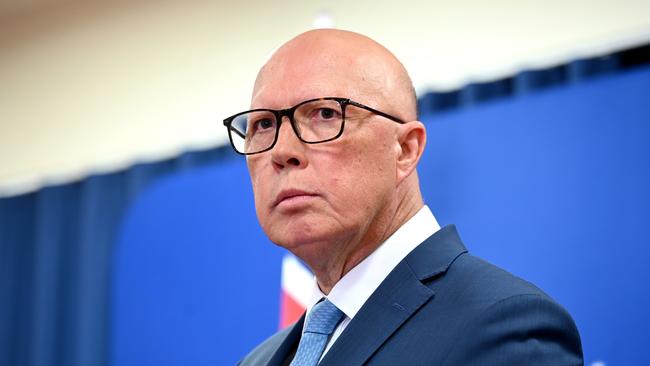
Just what Labor’s vision involves is shrouded in mystery in equal measure to the Coalition’s grand plan. But a promise of more of the same will not only be insufficient for Albanese, it also will be potentially lethal to Labor’s re-election chances.
Both leaders are asking voters to trust them. But with what?
Albanese’s pitch will be of better times ahead. This week his Treasurer, Jim Chalmers, declared the worst of the cost-of-living crisis was now behind us. This is a bold and presumptive claim to make. It is laden with risk as it assumes a return to optimism that cannot yet be assured.
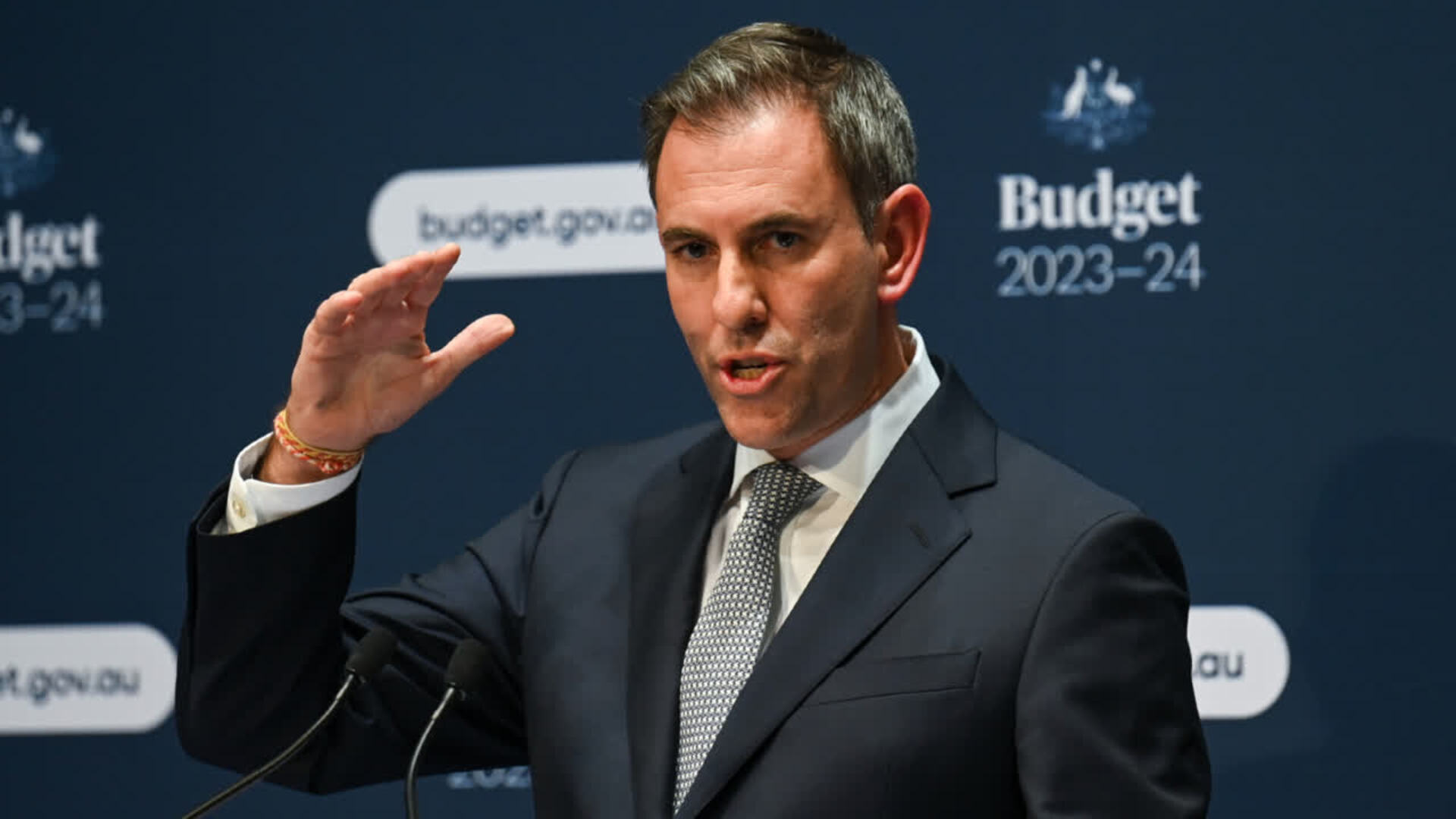
“This election is about the future versus the past,” Albanese tells Inquirer in his first major interview ahead of the election year.
“Peter Dutton picked up a telescope to search for a vision but is looking through the wrong end. We have laid our foundations in our first term. We had a lot of things to repair that were in crisis – aged care, childcare, housing, wages going backwards, inflation with a 6 in front of it, not to mention a skills crisis.
“You can’t fix everything in one term but we are delivering progress. (But) the choice is simple. We understand people are doing it tough but it would have been tougher if Dutton had gotten his way. Real wages wouldn’t have increased … there wouldn’t have been energy bill relief.
“On housing, he opposed all the measures we have done. And he has a history of savage cuts. This election is about who has a vision for the future … Dutton is about the past, he will take the country backwards, and we will be worse off.”
Make no mistake, the next election is a tournament of deep philosophical dispute. This goes beyond the simplistic contest of small government versus more government. It goes to the purpose of government itself.
As Paul Keating declared in 1996, when you change the government you change the nation.
But this is not a contest that will be decided over grand plans and bold ideas. If anything, there is little stated vision of what a future Australia would look like.
At its most basic, it will come down to voters deciding which side of politics is sitting on their side of the fence with a practical solution to the problems the nation is facing: inflation, interest rates and a falling standard of living.
The Coalition has identified what it believes is a new mass grievance group – one described by one senior Liberal as the hardworking, law-abiding class – that will revolt against the government. This is a reversal of Labor’s craft of cobbling together different grievance groups to form a constituency. Dutton has been handed the middle-class counter-revolution. “This is the great sliding door moment for the nation,” he says.
“The Albanese government doesn’t have a good story to tell other than a belief that no one will vote for Dutton. That has fallen flat for them and now they are scrambling around for an agenda.
“Labor was always going to rely on personal attacks. I suspect the floodgates are going to open on that. I’ve always believed we could win, and win majority government. There was no point going into this season believing you can only win next season’s grand final.
“I believe we can win for a number of reasons – the discipline the team has had, we look like a credible alternative, and that’s not easy to achieve. At the same time it is a bad government under pressure from a disciplined opposition.
“That’s been a recipe for the preconditions to be met to take government after just one term. “But it takes more than that. People might say instinctively that Albanese has only had three years so give him another go, and there had been international factors, and that’s a reason to justify voting for him again. But people have moved beyond that now.
“People can see we offer a safe hand on the economy and national security. We will have policies which will show how hard we have worked in the past 2½ years, that will demonstrate we are a credible alternative.”
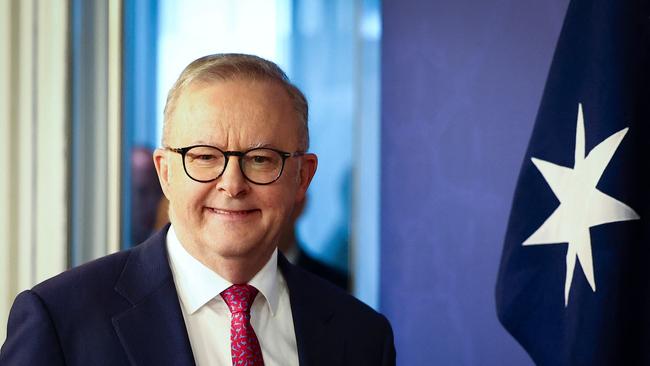
There is no dispute that the election will revolve around the single economic axis of cost of living. But it also will be a bare-knuckled contest of personalities.
Dutton’s charge against Albanese is weakness as leader. This was a feature he identified early and has sought to exploit, and it has stuck. Albanese’s argument is the polar opposite: Dutton presents a known risk, with a ruthless history in Liberal portfolios of hacking into the public service – the hard man of politics.
These are themes that already resonate. Dutton measures strongly against Albanese on leadership, whereas Albanese presents compassion. This is the leadership dichotomy.
“My argument to the Australian people will be that I’ve been on the frontbench of the Liberal Party in government and opposition for 20 years,” Dutton says.
“I come into this role with more experience than anybody since John Howard. Experience matters. This is about confidence, to make decisions in the country’s national interest, even if they are tough decisions, and a track record of being able to make those decisions.”
The Liberal leader’s gamble is his offer of a return to an orthodoxy of economic management aligned with the Coalition governments of more than 20 years ago.
There is a rich irony in that it borrows directly from the campaign Kevin Rudd used in 2007 against the expenditure of the Howard-Costello government.
“Our other message is that the reckless spending has to stop, it can’t continue, it’s killing the economy,” Dutton says.
“I actually think because of (Reserve Bank of Australia governor) Michele Bullock’s work, the penny has dropped for people and they realise you can’t fix cost-of-living pressures overnight, but to bring pressure down on their household budgets you have to get inflation back down and productivity up, and that requires a back-to-basics approach to achieve that and I think people understand that.
“We have been conscious from day one that we were not going to be a Labor-lite alternative and I think Labor through some of its positions on economic mismanagement, border issues and national security issues have made it that clear. And that’s why there is a lot at stake.
“Our strategy is based on the experience of working in the Howard government, having worked with Peter Costello … there will be a continuation of the economic model they fashioned post-Keating.
“The damage Labor is doing again and the agreement with the Greens and endless spending will just keep making the situation worse for families if they are re-elected. All we are seeing at the moment is a repeat of history and that involves Labor governments, particularly if it were to be a Labor-Greens government, it will compound bad decision after bad decision, which is why people are hurting at the moment.”
Also drawing on recent history, Albanese’s charge is that Dutton’s intention is to return the country to a past that an entire generation won’t recall and that contrasts with a renewed Labor vision.
But so far this vision is unclear, if evident at all. The Prime Minister has failed to define what Labor’s “future vision” will look like, other than a continuation of its first-term agenda into a second.
While he may believe Labor’s record of achievement is a sound one, this jars with the experience of households having suffered such acute declines in their living standards.
Albanese’s pitch is “Building Australia’s future”. It seeks to replicate a pledge of mild reform rather than revolution. The Prime Minister explicitly has ruled out any further reforms to the industrial relations architecture. A recognition of accomplishment or the fear of having pushed too far?
It is no accident that Labor’s federal campaign resembles NSW Labor premier Morris Iemma’s successful 2007 campaign pitch of “more to do but heading in the right direction”.
Albanese is naturally defensive of his government’s record in office and points to the stability of management and reforms to childcare, aged care and real wage increases.
“We are proud of our record but we understand global inflation has made it harder for people to get ahead, that’s why our economic record is not something we should shy away from,” he says.
“We delivered two budget surpluses, the biggest fiscal turnaround ever … we have inflation with a 2 in front of it, unemployment with a 3 in front of it and real wages increasing.
“We understand there is more to do, the slogan we have chosen is ‘Building Australia’s Future’. With further support we can deliver what Australia needs.”
Albanese’s central problem is the contrast between his political story of his record so far in government and his future proposition. What he believes is a government of achievement and the experience of households are in conflict.
He is cognisant of this challenge, conceding that few had expected the inflation problem to last as long as it did.
“The big thing that people underestimated, I had briefings at the time, no one expected the Russian invasion of Ukraine to go on this long, everyone thought it would be over quickly,” Albanese says.
“It has had an enormous impact, in Europe in terms of what they did on gas, that had an impact throughout the globe. Inflation peaked earlier and higher than here but it had a huge impact.
“What we have managed to do … we have managed to get a landing that hasn’t caused a recession, unlike so many other countries … and the fact you haven’t seen unemployment go through the roof.”
Labor’s approach has meant that it has had to wear the political pain longer at a time when incumbent governments internationally have been punished electorally.
“But a Labor government will never say we want more people to be unemployed.” Albanese says.
“That’s literally what some of the economists were calling for … And if you compare our government with what has happened around the world, which economy would you rather be? New Zealand has just gone into a deep recession. We have had one negative quarter of growth and we had to fix the migration system …
“And if you look at a first-term government compared to previous first-term governments, there has not been a single resignation (from cabinet). It has been a model of stability and the management of the show has been exemplary.”
Dutton shouldn’t assume that because it has been a tough three years dealing with inflation that this provides a natural glide path to victory for the opposition, as has occurred in recent elections around the world.
Inflation kills governments, but it may not necessarily kill the Albanese government.
Labor will capitalise on the $100bn in savings measures the Coalition has already announced by cutting Labor programs. Most are off-budget items. Yet Albanese has already identified health and Medicare as target issues.
Surely Dutton would have seen this coming.
Albanese sees the contrast in traditional Labor terms.
“For all of those areas there is a stark contrast,” Albanese says. “Our emphasis is on what we are delivering today but there is more to do … we already have measures out there, in cutting HECS debt, making sure free TAFE is permanent, and the childcare and infrastructure investment.
“You need more than one term to fix up a decade of neglect and put in place reforms that change the country, such as the transformation of manufacturing, and part of that is connected to the transition to next zero … fixing the skills shortages, aged care reform.
“And the third-term agenda is shifting through to universal provision of affordable childcare. That’s not something you can fix in one step.”
Albanese also cites the restoration of relations with China as a keystone foreign policy achievement during his term.
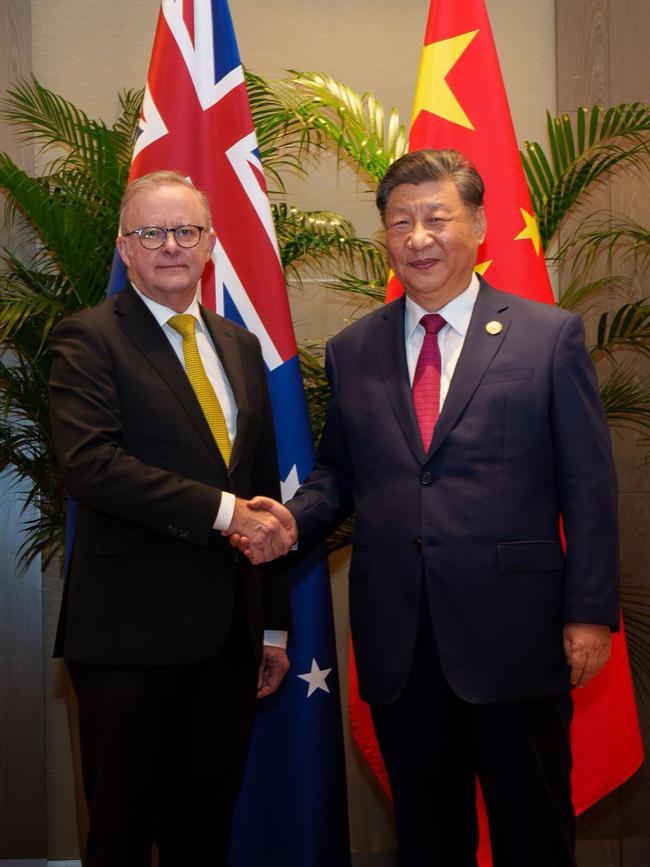
Dutton says that beyond the economic argument, two other themes will become central to the campaign.
“They don’t usually feature in the federal polling but they are at the moment,” he says. “It’s youth crime, motor vehicle theft, knife crimes, a spike in domestic violence, releasing criminals from immigration detention, boats making land in the north … And it’s their position on Israel, then there is the South China Sea, Ukraine, and the Israel-Palestinian issue.
“All that has bubbled to the surface as issues … layer on layer and they have seen the PM falter at every test.” Dutton also says there has been a shift in public mood on identity politics and the broader woke movement.
Labor strategists are alive to the possibility of Dutton bouncing off the back of Trumpism, most recently signified by his call for the country to unite under a single national flag and that he would dispense with Aboriginal and Torres Strait Islander flags at press conferences if he became prime minister.
This is being interpreted as Dutton giving up on winning back teal seats, which means his path to victory is through discontent in the western suburbs of Melbourne and Sydney.
“I think there is a groundswell of revolt at that level,” Dutton says. “I think it is an issue at the election. I think parents have had a gutful of kids coming home preached to and indoctrinated on all sorts of agendas except maths and English.
“I think there is also a lot of angst in the workplace where people see all sorts of policies and agendas designed to please international investors but make it harder to get a promotion or run a business properly.”
Dutton stands accused of holding back policy but laughs off the suggestion of small-target politics.
He admits to taking a “calculated risk” on going with the nuclear option for energy policy.
“I think sometimes there are zero-risk options in politics, where you try and please 90 per cent of people, but that’s a recipe for failure for the country … that’s not the path I’ve taken,” he says. “We’ve made a calculated risk, it’s sensible, it’s based on what is in the country’s best interest.
“And it is evidenced by the government’s failure to mount any intellectual argument against the inclusion of baseload nuclear power to firm up renewables and transform the energy system into something reliable and affordable.
“The commentary about small target is ridiculous … it’s a big policy but it’s the right one for the country. It also shows to people we have a vision beyond just the three-year cycle.”
Albanese, however, also has proven that he is prepared to take policy risks. He was underestimated in opposition, just as he has been in government. While the voice referendum was a failed venture, the decision in January 2024 to abandon an election pledge on stage three tax cuts revealed a level of political courage that took the Coalition by surprise.
“The big call we made, the biggest call I made this term, was on tax cuts,” Albanese says. “It was a gutsy call that is benefiting people now … it has done more to assist people than just about anything.
“It was a calculated risk … a huge (political) risk at the time. It was a genuine change of position, I owned it, it’s not what we said we would do, but circumstances changed and it was the right thing to do. It was out of conviction rather than convenience.”
This decision alone should serve as a warning to Albanese’s critics that he will take a leaf out of Labor elder Graham Richardson’s book on political success – whatever it takes.




To join the conversation, please log in. Don't have an account? Register
Join the conversation, you are commenting as Logout